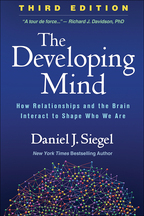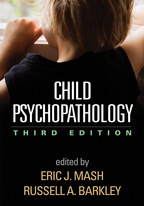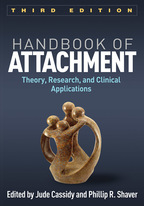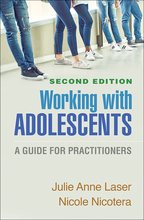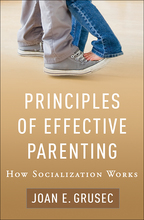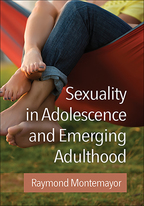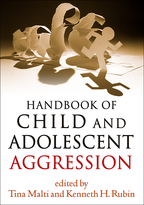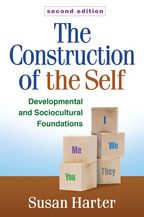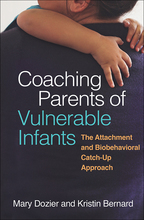Culture and Attachment
Perceptions of the Child in Context
Robin L. Harwood, Joan G. Miller, and Nydia Lucca Irizarry
Paperback
Paperback
orderApril 18, 1997
ISBN 9781572302464
Price: $43.00 169 Pages
Size: 6" x 9"
Copyright Date: 1995
“Useful and thought-provoking for readers with a focused interest in relationships between children and their caretakers across diverse populations as well as for those readers more broadly interested in the interplay of cultural meaning systems, socialization goals, and individual development and functioning.”

—Disability Studies Quarterly
“[This volume] provides a thoughtful and original consideration of research on cultural differences in mothers' goals for their toddlers' competent interpersonal relations, especially in terms of mother-child relations. It gives a valuable overview of theoretical approaches to culture and psychology as well as to the empirical literature on culture and attachment. In addition, it offers important data and analysis of cultural views emphasizing development of individuation and relatedness for Anglo-American mothers and emphasizing becoming involved and responsible participants in the community for Puerto Rican mothers, of varying social classes. The bottom line is that mothers' interpretation of toddlers' behavior and goals for their children's social relations involve anticipation of what is required for success in their own community.”

—Barbara Rogoff, Ph.D., Professor of Psychology, University of California, Santa Cruz
“The authors address the very important issue, `How is the attachment relationship both universal and culturally shaped?' They provide an important perspective and data to support the understudied idea that the early relationship between parent and infant shows both similarities and differences due to cultural variations. The uniqueness of this volume is the authors' message that attachment behaviors provide a rich perspective from which to study and understand cultural meaning systems. Through this work done across cultures, we are provided with a new and more meaningful understanding of alternative models of normative development and ways to conceptualize socioemotional development. The book is highly recommended for students of child development, sociology, and other social sciences to learn more about cultural variations in the attachment relationship and what such early socioemotional development may tell us about the meanings of behaviors with and across cultures.”

—Joy D. Osofsky, Ph.D., Professor of Pediatrics and Psychiatry, Louisana State University Medical Center, New Orleans
“In attachment theory, a universal status has been attributed to the primary attachment relationship between infants and their parents. Each infant is assumed to be genetically biased to display attachment behaviors towards a protective adult, irrespective of social class or culture. In Culture and Attachment, the authors emphasize the importance of studying the symbolic meaning of attachment in addition to its behavioral manifestation. In elaborating the parental perceptions of attachment behaviors they open up new ways of interpreting and conceptualizing the relation between attachment and culture. A secure child in the U.S. shows the same behavioral pattern as a secure child in Puerto Rico, but parents from both cultures appreciate the infants' security for completely different reasons. Through extensive quotes from interviews with U.S. and Puerto Rican mothers the authors illustrate the universality as well as the culturally specific dimensions of attachment. Their combination of developmental and anthropological insights and methods enables the authors to contribute in a unique way to the emerging discipline of cultural psychology.”

—Marinus H. van IJzendoorn, Ph.D., Professor and Chair, Center for Child and Family Studies, Leiden University, the Netherlands
—Disability Studies Quarterly
“[This volume] provides a thoughtful and original consideration of research on cultural differences in mothers' goals for their toddlers' competent interpersonal relations, especially in terms of mother-child relations. It gives a valuable overview of theoretical approaches to culture and psychology as well as to the empirical literature on culture and attachment. In addition, it offers important data and analysis of cultural views emphasizing development of individuation and relatedness for Anglo-American mothers and emphasizing becoming involved and responsible participants in the community for Puerto Rican mothers, of varying social classes. The bottom line is that mothers' interpretation of toddlers' behavior and goals for their children's social relations involve anticipation of what is required for success in their own community.”
—Barbara Rogoff, Ph.D., Professor of Psychology, University of California, Santa Cruz
“The authors address the very important issue, `How is the attachment relationship both universal and culturally shaped?' They provide an important perspective and data to support the understudied idea that the early relationship between parent and infant shows both similarities and differences due to cultural variations. The uniqueness of this volume is the authors' message that attachment behaviors provide a rich perspective from which to study and understand cultural meaning systems. Through this work done across cultures, we are provided with a new and more meaningful understanding of alternative models of normative development and ways to conceptualize socioemotional development. The book is highly recommended for students of child development, sociology, and other social sciences to learn more about cultural variations in the attachment relationship and what such early socioemotional development may tell us about the meanings of behaviors with and across cultures.”
—Joy D. Osofsky, Ph.D., Professor of Pediatrics and Psychiatry, Louisana State University Medical Center, New Orleans
“In attachment theory, a universal status has been attributed to the primary attachment relationship between infants and their parents. Each infant is assumed to be genetically biased to display attachment behaviors towards a protective adult, irrespective of social class or culture. In Culture and Attachment, the authors emphasize the importance of studying the symbolic meaning of attachment in addition to its behavioral manifestation. In elaborating the parental perceptions of attachment behaviors they open up new ways of interpreting and conceptualizing the relation between attachment and culture. A secure child in the U.S. shows the same behavioral pattern as a secure child in Puerto Rico, but parents from both cultures appreciate the infants' security for completely different reasons. Through extensive quotes from interviews with U.S. and Puerto Rican mothers the authors illustrate the universality as well as the culturally specific dimensions of attachment. Their combination of developmental and anthropological insights and methods enables the authors to contribute in a unique way to the emerging discipline of cultural psychology.”
—Marinus H. van IJzendoorn, Ph.D., Professor and Chair, Center for Child and Family Studies, Leiden University, the Netherlands

